This is a guest blogpost by Josiah Fiscus. Josiah Fiscus is a 31-year-old gamer from Pittsburgh, PA who has been playing CCGs and designer board games for over two decades. When he’s not at the game table, you’ll find him playing drums and serving as a deacon in his local church or enjoying time outdoors with his wife, Erin, and two kids (ages 5 and 3).
Many CCG strategy articles will discuss concepts like Card Advantage and Tempo. While these are important concepts in Epic as well, many of them can be boiled down to one concept: taking extra turns. Theoretically, if your opponent never got to take another turn, you would win the game. But just because there isn’t an Event that actually says “Your opponent loses a turn” doesn’t mean you can’t try to achieve that very same effect.
Principle 1: Consider what resources a turn gets you. You get 1 card. You get to prepare all your Champions. And you get 1 gold. If a power actually provided you with 1 gold, 1 card draw, and let you prepare all your Champions, it would effectively let you take an extra turn (and consequently, it would be completely broken). Still, each of these three elements makes up an important resource you gain simply by your opponent passing the turn to you. Any way that you can gain one of these resources essentially allows you to gain a partial “extra turn” over your opponent.
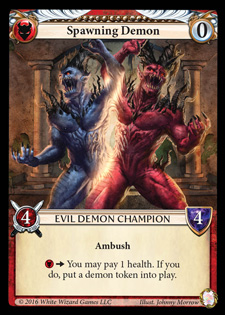
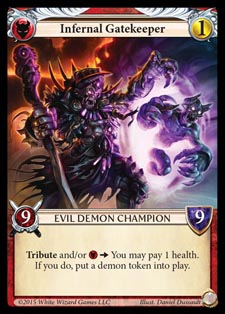 Principle 2: Break card parity on the board. When an opponent loses a card from the board, you are breaking card parity to your advantage. So, look for places where you can spend a single card to deprive your opponents of multiple cards they’ve drawn. Let’s say you have no Champions on the board and your opponent plays two Spawning Demons, then an Infernal Gatekeeper, paying 3 health to also create 3 demon tokens. You now have an opportunity on your turn to play Divine Judgment, spending 1 card to eliminate 3 of your opponent’s cards. (Note that you have not eliminated 6 of his/her cards, since the three demon tokens did not have to be drawn; thus, you haven’t wasted the draw portion of your opponent’s turn on those 3 demons). However, in a situation where you cast Spite on a Spawning Demon, you have each spent a card, which simply maintains card parity. Even worse, if you play Vanishing on a Spawning Demon, you have spent a card, but your opponent can simply replay the Spawning Demon, meaning you have actually made yourself lose a partial turn. Neither of these latter situations is really to your advantage (though they may sometimes be necessary).
Principle 2: Break card parity on the board. When an opponent loses a card from the board, you are breaking card parity to your advantage. So, look for places where you can spend a single card to deprive your opponents of multiple cards they’ve drawn. Let’s say you have no Champions on the board and your opponent plays two Spawning Demons, then an Infernal Gatekeeper, paying 3 health to also create 3 demon tokens. You now have an opportunity on your turn to play Divine Judgment, spending 1 card to eliminate 3 of your opponent’s cards. (Note that you have not eliminated 6 of his/her cards, since the three demon tokens did not have to be drawn; thus, you haven’t wasted the draw portion of your opponent’s turn on those 3 demons). However, in a situation where you cast Spite on a Spawning Demon, you have each spent a card, which simply maintains card parity. Even worse, if you play Vanishing on a Spawning Demon, you have spent a card, but your opponent can simply replay the Spawning Demon, meaning you have actually made yourself lose a partial turn. Neither of these latter situations is really to your advantage (though they may sometimes be necessary).
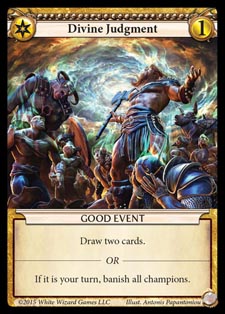
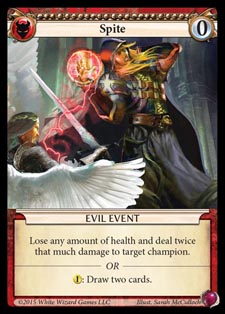
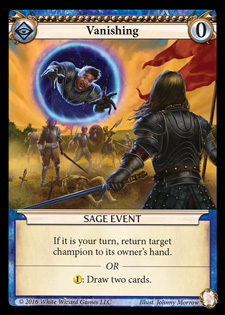
Principle 3: Break card parity in hand. Keep in mind that for the purposes of card parity, a card in hand is the same as a card on the board (remember our Vanishing on Spawning Demon example). Now, this is not necessarily true in terms of gold parity. It’s much more sensible to Vanishing a Trihorror than a Spawning Demon, for example, since you’ve essentially traded your turn of card draw for your opponent’s turn of gold. One of the best cards for breaking card parity in hand is Thought Plucker, which nets you +2 each time it successfully attacks, as well as when you play it. And I’d be remiss if I didn’t mention Muse, who has the potential for a +1 every turn without costing you a single gold.
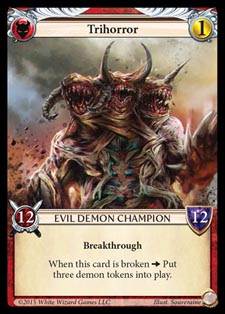
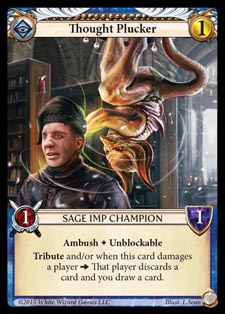

 Principle 4: Break gold parity. Breaking gold parity is possibly even more important than card parity, but the very strongest cards can achieve both at once. You may have noticed we have not yet addressed the gold you receive during your opponent’s turn. It could be argued that, if you are optimizing correctly, a true “extra turn” consists of gaining TWO gold because of this. But because this gold cannot always be utilized (unlike the gold on your turn, the card you draw, and the preparation), it’s better to think of the gold on your opponent’s turn as yet another opportunity to gain an extra partial turn. Thus, spending a gold on your opponent’s turn for a “draw 2 cards” Event really gives you nearly an entire extra turn (using the extra gold and netting +1 card parity), except for the free preparation. An excellent card to break gold parity in your favor is Sea Titan. Used optimally, he will return a 1-gold Champion to your opponent’s hand. Note this causes no change to card parity. Yet because in order to benefit from the returned Champion, your opponent will have to spend a gold to replay it, you’ve effectively cost your opponent a partial turn (gold). Moreover, because Sea Titan is Untargetable, your opponent will likely have to spend yet another gold and another card on a sweeper to get rid of it. Brutal.
Principle 4: Break gold parity. Breaking gold parity is possibly even more important than card parity, but the very strongest cards can achieve both at once. You may have noticed we have not yet addressed the gold you receive during your opponent’s turn. It could be argued that, if you are optimizing correctly, a true “extra turn” consists of gaining TWO gold because of this. But because this gold cannot always be utilized (unlike the gold on your turn, the card you draw, and the preparation), it’s better to think of the gold on your opponent’s turn as yet another opportunity to gain an extra partial turn. Thus, spending a gold on your opponent’s turn for a “draw 2 cards” Event really gives you nearly an entire extra turn (using the extra gold and netting +1 card parity), except for the free preparation. An excellent card to break gold parity in your favor is Sea Titan. Used optimally, he will return a 1-gold Champion to your opponent’s hand. Note this causes no change to card parity. Yet because in order to benefit from the returned Champion, your opponent will have to spend a gold to replay it, you’ve effectively cost your opponent a partial turn (gold). Moreover, because Sea Titan is Untargetable, your opponent will likely have to spend yet another gold and another card on a sweeper to get rid of it. Brutal.
Principle 5: Look for other methods of breaking parity. Ambush and Blitz are the two primary abilities that allow you to break preparation parity. While prepared Champions can’t be considered a “resource” in quite the same way as cards and gold can, being able to attack and use powers outside of the normal timing can still be quite powerful. The ideal use for an Ambush Champion is to spend the extra gold on your opponent’s turn (+1 gold parity), function as a surprise blocker to kill an attacking Champion (+1 card parity and possibly +1 gold parity), and then finally, on your turn, being able to attack right away, breaking the normal preparation rules. This is the reason why those perfect surprise blocks feel so good; it’s like taking an entire extra turn! A final resource to consider is your health. You don’t automatically gain health when you take a turn, so health gain can’t be considered a partial extra turn. Still, repeatable sources of health gain for you and health loss for your opponent (such as Drinker of Blood or Inner Peace) can still be quite powerful, especially combined with the principles above. Health gain doesn’t grant you immediate extra turns, but gives you more actual turns in the long run, simply because you will have more opportunities for your opponent to pass the turn to you.
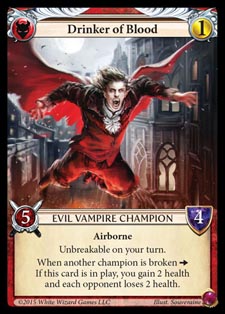


Recent Comments